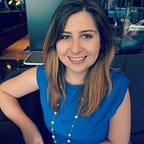We asked Mozfest to help us make online learning inclusive for women & refugees.
Here’s what came out of it.
Written by Dina Ariss and Hera Hussain
The atmosphere at Mozfest is always electric! You can feel it in the air from the second you walked in. It brings together activists and enthusiastic people from around the world who all work towards making the internet accessible and more inclusive.
Our session was part of digitally inclusion space. What we really hope from the session is that we’ll be able to collect feedback on Soul Medicine from the bright, creative minds at Mozfest, as well as ideas on potentials bite sized courses, insight on how we could best design the courses and hopefully even recruit some enthusiastic volunteers to join our squad.
Here was the challenge we presented to the attendees at our workshop.
Have you ever tried to see how to get a restraining order against a stalker? Or how to prove in court you are being abused by your partner? Give it a try. A few minutes on Google (or DuckDuckGoGo!) will show that that this information is hard to find, and what exist is vague and lacks detail. Imagine how much more difficult it would be for a refugee woman who is not familiar with the UK legal system and doesn’t speak fluent English.
Soul Medicine will be a platform for Chayn and other non-profit organizations to deliver content (guides, tool kits, courses, etc.) in small digestible doses via SMS, email and Facebook messenger. Soul Medicine believes that breaking down complex information, and communicating it in multiple languages as well as sending it a time suitable to the receiver makes this a more user-centred learning platform. We’re working on the hypothesis that not only is knowledge helpful for making informed decisions, but it can also bring a bit of cheerfulness that can be a powerful weapon against depression.
Barriers:
- A recent study by Safe Lives, Snook & Chayn (yes, us!), commissioned by Comic Relief, found that almost half of the women surveyed in UK had used technology to connect with other survivors and share their stories.
- 45% of women have experienced some form of online abuse during their relationship, and 48% experienced harassment and online abuse from their ex partner once they’d left their relationship (Women’s Aid, 2014).
- Women who are facing abuse and surveillance from partners often have very little time to find what they need and access help.
- Often women will come across information that was not only hard to find but also often duplicated while missing key answers.
- More needs to be done for people with additional barriers such as disability, remote location and lack of fluency in the local language.
We divided the participants into two groups to build personas as well as relevant content for these personas. We got two personas from the groups. You can see them here:
At the end of the session, we had two user personas, as well as two examples of what bite-sized courses could potentially look like. During the session, questions relating to the definition of micro course were raised. Would the definition change based on the medium? Would all the courses be delivered via micro courses? How could we make the courses as interesting and engaging as possible to avoid having users unsubscribe?
Some of these questions are not easy to answer. We are still trying to answer them through user interviews. We’ll work out a hypothesis and then iterate on it based on user feedback.
On reflection, the format of the workshop may not have been suitable for everyone, as you needed to have a certain level of familiarity with the rather specific challenges that vulnerable women face. In the second iteration of this workshop, we’ll delve deeper into some of these points.
We’re excited to share how this project progresses. Stay tuned!
If you are interested in our work or have any thoughts on how we could improve we’d love to hear from you! Please contact us at team@soulmedicine.io
